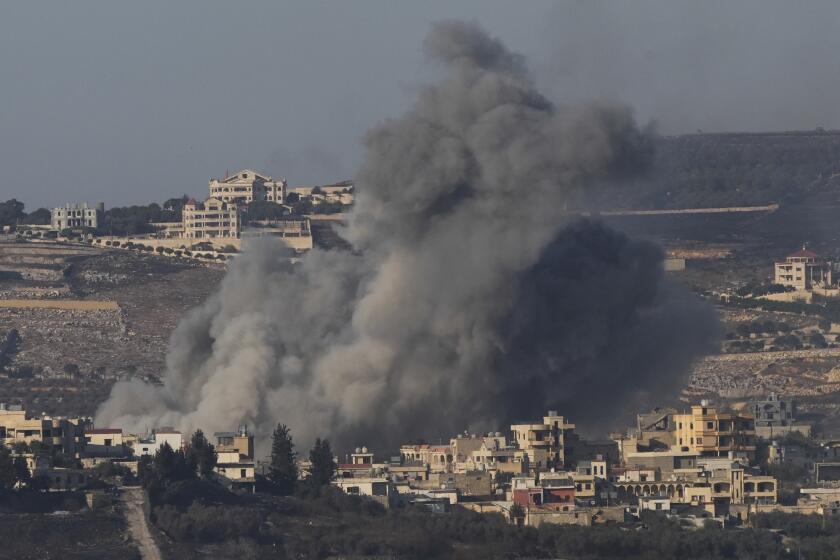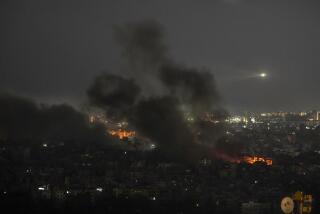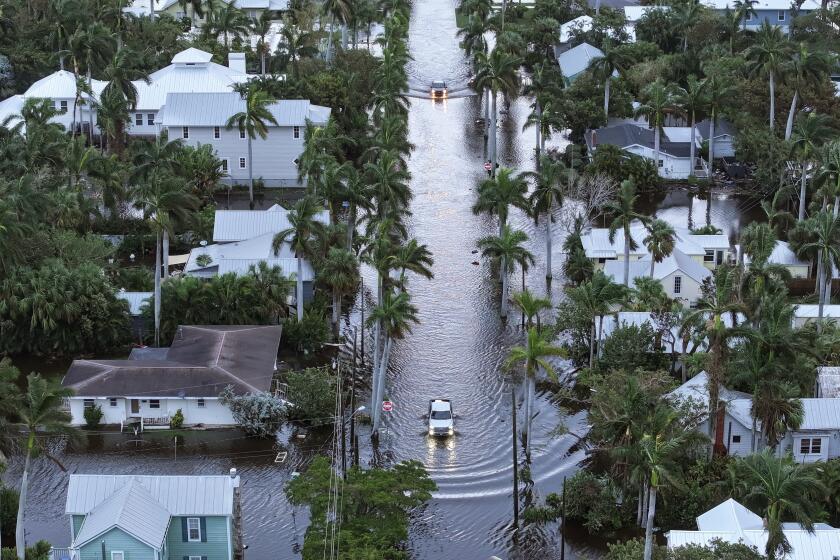Hezbollah faces backlash in Lebanon as Israel’s invasion widens

- “Hezbollah ... is taking the whole country to hell with it.”
- Much of the anger at Hezbollah springs from how quickly the group appears to have been decimated.
- Die-hard Hezbollah supporters complain Iran has failed to come to their aid.
As Israel’s invasion of Lebanon intensifies and brings more destruction on the Mediterranean nation, anger among the Lebanese with Israel is, not surprisingly, at an all-time high.
But displeasure with its foe, Hezbollah, is also growing.
With 1,400 Lebanese dead and more than 1 million displaced nationwide — a fifth of the country’s population — Hezbollah critics and supporters alike are voicing frustration over what many view as the group’s miscalculations.
“This is a war between Iran and Israel on Lebanese territory,” said Sami Gemayel, an MP with the Kataeb party, a long-time rival of Hezbollah.
“Unfortunately, today, we’re all stuck,” Gemayel said. “Hezbollah is continuing its war. It’s not willing to stop, and is taking the whole country to hell with it.”
A strike in Shebaa, Lebanon, kills a family of nine, including a woman eight months pregnant, reflecting the horror of the growing violence between Israel and Lebanon.
Family members of those killed in Israeli attacks are also blaming Hezbollah — an Iran-backed militant group and one of Lebanon’s biggest political parties — for lacking adequate plans to evacuate, shelter or rescue them.
Slowly picking his way through the rubble of what was the six-story building in a Hezbollah-dominated Beirut suburb where his brother lived, Mohammad, 40, who asked only to be identified by his first name, wondered when recovery crew workers would finally arrive. He said the bodies of his brother, sister-in-law and nephew lay in the wreckage.

Hezbollah officials told him he would have to wait because crews were already overburdened due to “the situation.” But workers, he pointed out, were actively recovering the bodies of Hezbollah members in a destroyed building nearby.
“We appreciate their sacrifice,” the man said. “But they chose this. Don’t tell me it’s ‘the situation’ when you get [Hezbollah members’ bodies] out and leave my family under the rubble. Why should my brother and his family wait to be buried? I know I won’t find their bodies. But give me some pieces of flesh I can put in a bag and go bury them.”
Many fault Hezbollah for starting the latest conflict with Israel.
A day after Palestinian militants from Hamas attacked southern Israel and sparked the Israel-Hamas war last October, Hezbollah joined the fight by launching a barrage of missiles and rockets at northern Israel. Hezbollah said it was seeking to aid Hamas and force Israel to fight on two fronts.
Some 60,000 people from northern Israel and 90,000 in southern Lebanon were displaced during a year of tit-for-tat border attacks.
The apparent assumption among Hezbollah leaders was that Israel’s exhaustion from its Gaza campaign would mean it had little appetite for an all-out war, especially against a well-armed adversary like Hezbollah. That assumption proved to be spectacularly wrong.
Late last month, Israel launched thousands of airstrikes across Lebanon, hitting Hezbollah-dominated areas in the south, east and the capital Beirut even as its forces began what the Israeli military called “a limited incursion.”
But Israeli evacuation orders keep expanding to new areas every few days, raising the specter of almost a third of the country being under occupation.
Nationalist and anti-Israel fervor is top of mind for most Lebanese, said Mark Daou, a Lebanese MP with a bloc not aligned with Hezbollah.
“All Lebanese want steadfastness against Israel,” he said. “If there’s an occupation, anyone who is Lebanese, no matter their sect, it’s their duty to fight and resist.”
Christian villages in southern Lebanon thought their neutrality may spare them from violence in the Israel-Hezbollah conflict. Then the evacuation orders came.
But he added that such sentiments do not absolve Hezbollah of blame for pushing Lebanon into war and tying its fate to the situation in Gaza — all at Iran’s behest.
“More and more Hezbollah is looking like a purely Iran-aligned apparatchik, as opposed to a locally ingrained Lebanese party,” Daou said.
Much of the anger at Hezbollah springs from how quickly the group’s leadership appears to have been decimated, with Israel demonstrating its spying prowess time and again by picking off the group’s top-ranking officials. That includes longtime leader Hassan Nasrallah, who was killed in a massive airstrike last month.

“It’s clear now none of this was calculated,” said Tony Chakar, a Beirut-based artist and architect who is not supportive of Hezbollah. “The basis for them entering the war was that they were prepared and had more than 100,000 missiles.”
“So where are they?” he asked. “If you have something, then show it.”
The criticism has extended to Hezbollah’s main patron Iran, with a growing suspicion among die-hard Hezbollah supporters that a lack of a meaningful response to Nasrallah’s killing was proof that the group was sold out by Tehran.
“This couldn’t have happened without betrayal,” said Ali, a Hezbollah supporter who lived in a Hezbollah-dominated area until his home was destroyed in an airstrike targeting what the Israeli military said was a weapons cache. He asked to be identified only by his first name. “Iran stabbed us in the back. It’s clear.”
So widespread is the dissatisfaction with Iran’s level of support that Hezbollah deputy leader Naim Qassem addressed the issue in a televised speech Tuesday.
“Iran decides how to support and how to give, and it gave [a lot] over the years,” he said, adding that “the battle is not one for Iran and Iran’s influence in the region … but rather to liberate Palestine.”
With Israel focusing its campaign primarily on Hezbollah’s loyalist areas, most of the displaced have been from Lebanon’s Shiite community. They escaped north with little more than whatever they could cram into or atop their vehicles. Those who didn’t find space with family or hastily prepared shelters now camp out in public squares, parks and even on sidewalks along Beirut’s famous beach promenade.
The longer they stay, the more friction there will be, said Mustafa Alloush, a Sunni Muslim MP from the northern city of Tripoli, where tens of thousands of displaced have found refuge.
“So far everyone is behaving,” Alloush said. Some locals are wary of taking in the displaced for fear of unknowingly harboring a Hezbollah member and drawing Israeli fire, but others have opened homes without concern for sect.
“But if it goes beyond a certain point, a social explosion is possible,” Alloush warned.

Israel appears to be banking on disenchantment with Hezbollah. On Tuesday, in a televised address, Israeli Prime Minister Benjamin Netanyahu called on the Lebanese people to “stand up” and take their country back from the group, warning them to “save Lebanon before it falls into the abyss of a long war that will lead to destruction and suffering like we see in Gaza.”
Analysts say Israel has a larger strategy aimed at turning the Lebanese against Hezbollah.
“The reason they’re not bombing other [non-Shiite] areas is because they want to create an environment for Hezbollah that is very inhospitable,” said Michael Young, an analyst at the Beirut-based Carnegie Middle East Center. “This suggests a much more [ambitious] plan than just a matter of securing the border.”
Gemayel, the Kataeb MP, fears such a scenario could bring about a repeat of the sectarian bloodletting that engulfed Lebanon during its 15-year civil war.
“As long as there’s hope these people can return home, we can handle it,” he said. “But once Israel decides to stay, it’s another story. Then Lebanon will implode.”
More to Read
Sign up for Essential California
The most important California stories and recommendations in your inbox every morning.
You may occasionally receive promotional content from the Los Angeles Times.













